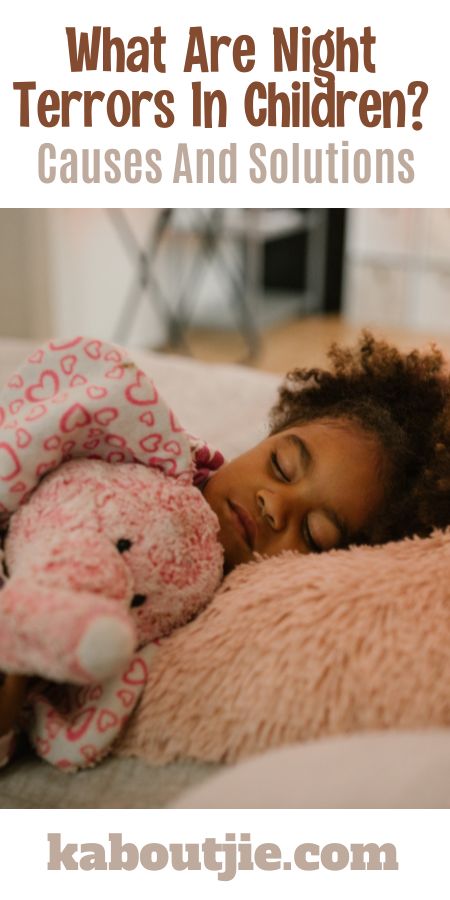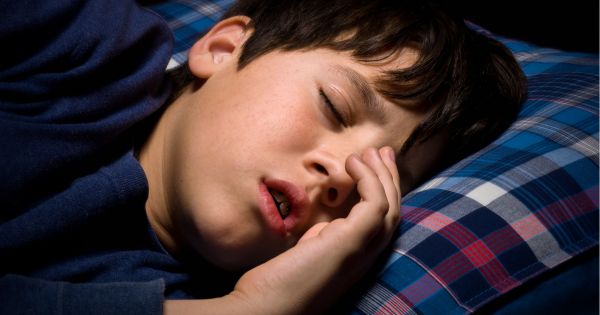As parents, we often cherish the peaceful sight of our children sleeping soundly, lost in dreams. However, the nights can occasionally bring about a different scenario—one that involves intense fear, confusion, and sleep disruption. Night terrors in children are a puzzling occurrence that can leave both parents and young ones feeling perplexed. In this article, we’ll explore the realm of night terrors in children, shedding light on their causes, symptoms, and how caregivers can provide comfort and support.

What Are Night Terrors In Children?
Night terrors, often referred to as sleep terrors, are a type of parasomnia that can affect children during their sleep. Unlike nightmares, which occur during the REM (rapid eye movement) stage of sleep and often involve vivid dreams, night terrors transpire during the non-REM stages, specifically during the transition from deep sleep to lighter sleep. Children who experience night terrors might appear to be awake but are actually still asleep, making the experience even more puzzling.
Causes Of Night Terrors In Children
Understanding the potential triggers of night terrors can help parents navigate this challenging situation:
Developmental Factors: Night terrors are more common in children aged 3 to 12 and tend to decrease as they grow older. They might be linked to the developing brain’s struggles to regulate sleep cycles.
Genetics: If night terrors run in the family, children might be more prone to experiencing them.
Sleep Deprivation: Lack of sufficient sleep or inconsistent sleep patterns can disrupt sleep stages, potentially leading to night terrors.
Stress and Anxiety: Children, like adults, can experience stress and anxiety from various sources, such as changes in routine, school-related pressures, or family dynamics.
Fever or Illness: High fever or illnesses that disturb normal sleep patterns can trigger night terrors in some children.

Recognising Symptoms Of Night Terrors In Children
Night terrors in children can be distressing for parents to witness. Some common symptoms include:
Intense Fear: Children experiencing night terrors might display extreme fear and panic, often accompanied by crying or screaming.
Confusion: Although their eyes might be open, children usually remain in a state of confusion and might not recognise their parents or caregivers.
Physical Agitation: Rapid breathing, increased heart rate, and even thrashing movements are common during night terrors.
Limited Memory: Children often have little to no recollection of the episode upon waking up.
Coping Strategies For Parents
Dealing with night terrors in children requires patience, empathy, and a few helpful strategies:
Maintain A Consistent Routine: Establishing a regular sleep schedule and bedtime routine can help regulate sleep cycles, potentially reducing the occurrence of night terrors.
Create A Calming Bedtime Ritual: Engage in relaxing activities before bedtime, such as reading a story or practicing deep breathing exercises.
Monitor Stressors: Identify and address potential sources of stress or anxiety in your child’s life, offering comfort and support where needed.
Ensure A Comfortable Sleep Environment: A cosy and secure sleep environment can contribute to more restful sleep.
Be Reassuring: If your child experiences a night terror, gently guide them back to bed and provide soothing words without waking them fully.

When To Seek Professional Help
While night terrors are usually harmless, persistent or extreme cases might warrant professional assistance. If night terrors significantly disrupt your child’s sleep or well-being, consulting a paediatrician or sleep specialist is recommended to rule out any underlying issues.
Night terrors in children can be unsettling for both parents and their young ones. By understanding the potential causes, recognising the symptoms, and implementing coping strategies, parents can navigate this sleep disorder with empathy and support. Remember that most children eventually outgrow night terrors, and with patience and care, families can work together to ensure peaceful nights for everyone.
 Kaboutjie SA Mommy Blogs by Lynne Huysamen
Kaboutjie SA Mommy Blogs by Lynne Huysamen





I think my 2 year old has night terrors sometimes, and she’s recently started sleepwalking as well. Not fun.
Adina we have been through the same thing with my daughter, well not the sleep walking… but my daughter definitely suffered with night terrors for a long time. Thankfully it seems she has outgrown it now.
Mine is talking and screaming not very good .
I think this is horrible for a child to have night terrors and for parent to try and help their child to calm them.
My son used to have them but eventually outgrown them